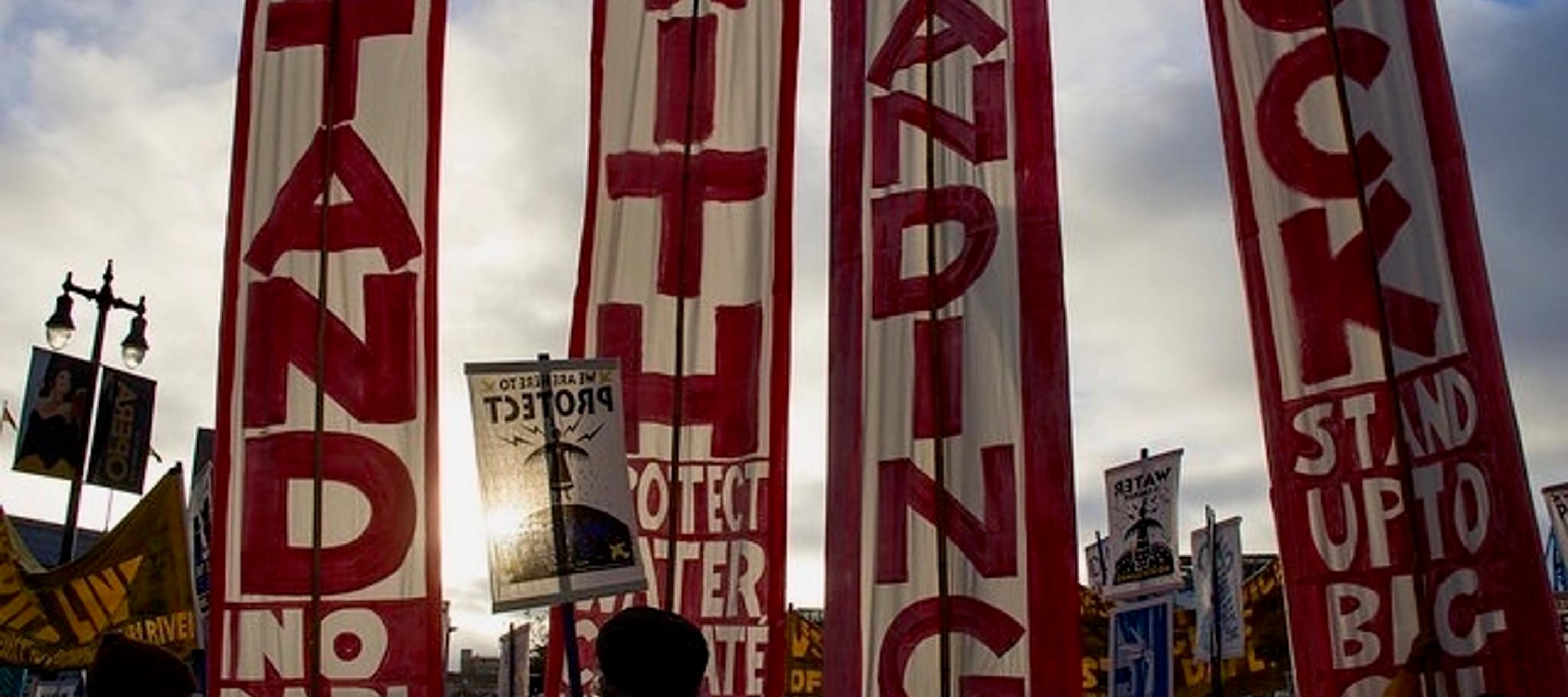Standing Rock Sioux - A Model for Protection of Planet and its People
21 December 2016

The Standing Rock Sioux Tribe met with representatives of Energy Transfer Partners (ETP) on October 30, 2014 and learned of their plans to build the Dakota Access Pipeline (DAPL), a 1,172 pipeline from North Dakota to Illinois that would carry 470,000 to 570,000 barrels of oil per day. A tribal spokesperson told us this month that their response to ETP was clear: they opposed a project “that would jeopardize our water and sacred sites.”
On December 4th the Army Corps of Engineers announced it will not grant the permit to drill under the Missouri River, near Sioux lands.
With most of the DAPL completed, the Standing Rock Sioux, after a months-long campaign against the pipeline, has won a major victory when, on December 4th the Army Corps of Engineers announced it will not grant the permit to drill under the Missouri River, near Sioux lands. Assistant Secretary for Civil Works Jo-Ellen Darcy said they would need to explore alternate routes for the crossing.
The Standing Rock Sioux Tribe, the Elders, International Indigenous Youth Council, and Oceti Sakowin Camp led a movement that touched tens of thousands of people, many of whom came to Standing Rock to show solidarity with the “water protectors”. Tribes across the US and Canada, veterans, religious leaders, human rights and environmental activists all came to stand with the Standing Rock Sioux. On a conference call with over 100 investors the day after the decision, Tribal Chairman Dave Archambault II said to us: “For once our voices are being heard and the right decision was made.”
The struggle is not over. The new US President-elect has declared his strong support for the project, and the Army Corps of Engineers’ decision could be reversed.
The struggle is not over. The new US President-elect has declared his strong support for the project and the Army Corps of Engineers’ decision could be reversed. Security and law enforcement has used violent tactics against the nonviolent water protectors, yet support for the movement to protect water, sacred sites and the right to self-determination remains strong.
The investor community can play an important role, particularly in engaging the seventeen banks that have provided loans for DAPL. On the December 5th investor call, organized by the Standing Rock Sioux, First Peoples Worldwide, and the Investors & Indigenous Peoples Working Group, information was shared about the risk to banks lending to the project because the oil markets have changed drastically since ETP negotiated the contracts in 2014, putting their investments at risk. Clark Williams-Terry, director of energy finance for Sightline Institute and co-author of the Institute for Energy Economics and Financial Analysis’s report, The High-Risk Financing Behind the Dakota Access Pipeline: A Potential Stranded Asset in the Bakken Region of North Dakota, said that there is a contractual obligation for ETP to complete the project by January 1, 2017, which is not going to happen. Companies that have committed to ship oil through the pipeline have a right to back out of their commitment.
The investor community can play an important role, particularly in engaging the seventeen banks that have provided loans for DAPL.
The current situation creates an opening to press the banks and energy companies to adopt strong human rights criteria that recognize and respect the rights of Indigenous Peoples, as determined in the United Nations Declaration on the Rights of Indigenous Peoples, the ILO Convention 169 on Indigenous and Tribal Peoples. Members of the Interfaith Center on Corporate Responsibility have already filed shareholder resolutions with a number of companies, including Enbridge Energy, Phillips 66, Marathon Petroleum, Wells Fargo, Morgan Stanley and Goldman Sachs, with more to come. The resolutions call on the banks to issue a public report on the North Dakota DAPL, describing its financing of companies involved in the pipeline and whether its Indigenous rights policy was applied, and to consider policy options to improve implementation, including enhancing the risk metrics and due diligence process. Free, prior and informed consent is central to any meaningful criteria to assess whether or not to invest in projects that impact Indigenous lands and communities.
Free, prior and informed consent is central to any meaningful criteria to assess whether or not to invest in projects that impact Indigenous lands and communities.
With the Brexit decision in the UK in June and the results of the November US presidential election, the human rights and business community is doing some soul-searching about what serious challenges it might face in 2017 and beyond. In this context the Standing Rock Sioux and its supporters present an example of effective action and the ripples of hope have gone out to a wide circle of humanity with the message that committed leadership, nonviolent action and respect for the earth can create transformative change.
Image: Flickr/Peg Hunter



